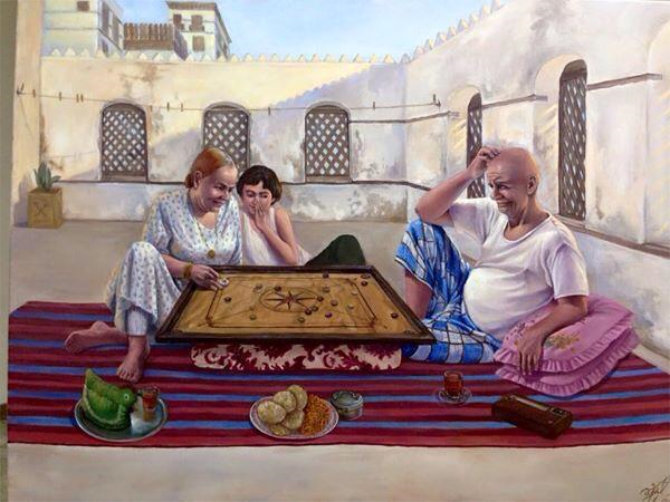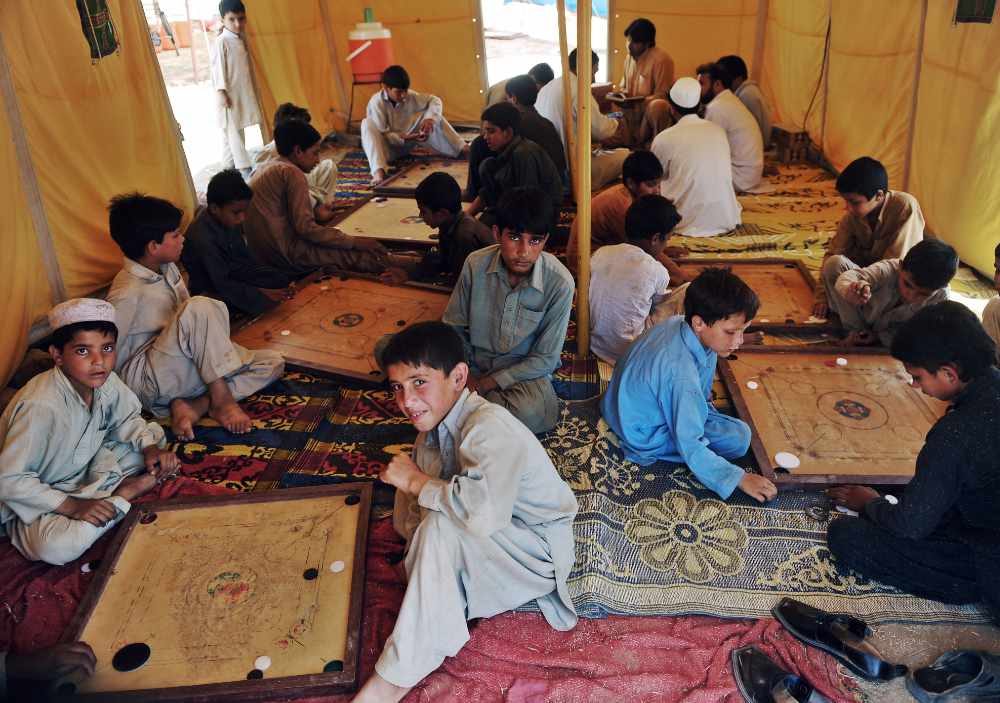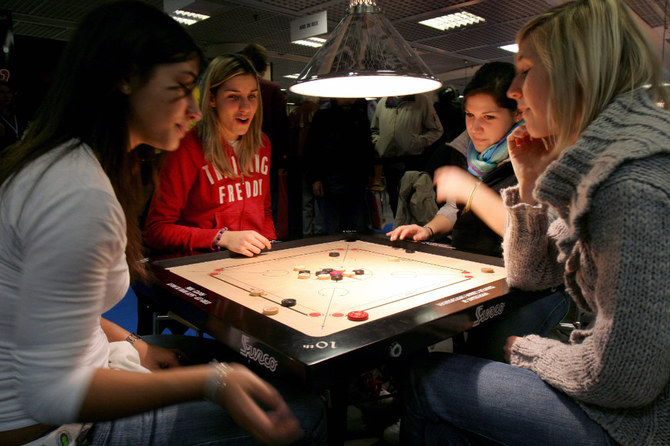JEDDAH: When the global coronavirus pandemic hit, some countries ignored it, while others had people singing from their balconies to keep their spirits high.
In Saudi Arabia, people trooped to toy stores to buy a largely forgotten traditional board game, carrom, which quickly sold out across the Kingdom.
Carrom is a wooden table-top board game that bears many similarities to pool. Different standards and rules exist in different parts of the world.
The board, square in shape, is often placed on four wooden legs, with each player occupying one side of the square.
Demand for carrom boards has rocketed as lockdowns and curfews aimed at halting the spread of the coronavirus force Saudis to look for ways to keep boredom at bay.
For many families, there is no better way to stay entertained than by playing carrom, a board game that both old and young enjoy.
Carrom is popular in many parts of the Gulf region, especially in the coastal areas of Saudi Arabia, where its appeal cuts across all age groups.
Majid Al-Dosari, an engineer working from home in Jeddah, considers himself lucky to have bought a carrom board just days before the item sold out.
“I got into it a few weeks ago after playing games with my future in-laws, and I wanted to get one for my family,” he told Arab News.
“We usually meet up for lunch, but now we play carrom together throughout the day. It’s coffee and tea and carrom with my brother, his wife and my sister.”
When Jeddah was placed under curfew, Al-Dosari placed his order through the Haraj website. The seller delivered the item to his house two days later for SR90 ($24).
“Prices of carrom boards tripled afterwards, going up to SR300-400. They sold out very quickly,” Al-Dosari said.
In many stores in Jeddah, including shops in the city’s downtown area, the board game is now out of stock.
THE RULES OF THE GAME
A carrom game is a competition between two individual players or two teams of two players each. Rival teams are assigned white or black coins before the game starts, and each team tries to win by sinking all nine coins of their color in the pockets and securing the red-colored queen. The queen can only be pursued after at least one carrom man of the player’s color has been secured. It cannot be secured if its pocketing is not followed up by the sinking of a carrom man of the player’s color.
If either condition is not met, the queen has to be placed back in the middle of the board. Each black and white piece counts as one point, while the queen counts as 5 (3 universally) points. The scoring system varies from region to region, but in most parts of Saudi Arabia, the team that collects 21 points (25 universally) wins the game.
Customers now are searching the websites of online retailers that claim to import the best carrom boards from India for delivery in Saudi Arabia.
Carrom is most commonly played during Ramadan nights as people stay up with family members or friends, waiting for the early morning call to prayer.
At the beginning of a game, small circular wooden disks, called carrom men or coins, are massed in a group in a circle at the center of the board.
The arrangement is considered complete when nine black coins and nine white pieces are positioned in Y formation, surrounded by black coins and the red “queen” in the center.
A puck, known as “striker,” is then used to flick carrom men and the queen into pockets located at the board’s four edges.
Carrom lore suggests that the game first reached Saudi Arabia via the Hijaz region through traders from India.
Over the decades, it became an important part of social life in the Kingdom, featuring in family events, all-female or all-male meetings, and even in gatherings of children.

Artist Najat Mutahr's tribute to Hijaz's connection to the board game: Saudi grandparents playing carrom with grandchild. (Artwork by @nmutahr)
Saudi artist Najat Mutahr has highlighted Hijaz’s links with carrom through an artwork showing grandparents playing the board game with their grandchild.
Saad Al-Suwaiyan, a Saudi anthropologist, has described carrom as one of the games played by Saudis for generations and whose appeal has no age limits.
Tribute has been paid in the 12th volume of Al-Suwaiyan’s series “Traditional Culture of Saudi Arabia,” which is dedicated to popular games and their significance in Arab and Saudi social life.
References to carrom are also to be found in Saudi literature. In her book “Carrom,” published in 2019 by Dar Molhimon, author Rehab Abu Zeid referenced the rules of the game in tackling issues of patriarchy and paternalism, with the first stroke of a game unleashing chaos on the lives of the novel’s characters.
THE ORIGINS OF CARROM
Carrom is known in different regions of the world in different ways: kayrum (Arabic), caroom, karom, couronne, carum, karam and finger billiards.
The modern version is believed to have originated in India. One carrom board with its surface made of glass is available in one of the palaces in the former princely state of Patiala.
It became very popular among ordinary Indians after World War I, when different provinces began to hold competitions.
The world’s longest carrom marathon lasted 34 hours, 45 minutes, 56 seconds in India. The fifth round of Carrom World Cup was held in South Korea in 2018.
In Saudi Arabia, there are several variations of the carrom game. The most common, Money or Fuloos, pits two individual players against each other.
Players can collect points starting from five for a black piece, 10 for a white one and 50 points for the queen.
The player who collects the most points wins. The arrangements of the coins can vary, but the queen remains central.
Knowledge of the rules of the game are once again in demand in Saudi households.
“I grew up playing carrom with my mom and her family,” Nahid Noor, a 39-year-old teacher from Jeddah, told Arab News.
“The competition tended to be fierce. A tournament would often materialize in the course of a gathering.”

Carrom is a very popular game among South Asian children. (AFP file photo)
Noor, a mother of two, said that that over the years, her family had lost the habit of carrom playing.
The game was played only rarely — until the coronavirus lockdowns began.
She describes her family’s carrom board as battered and old, but invaluable.
“I just can’t seem to find another one of such high quality. I think my mother bought it from a toy shop in Jeddah seven years ago,” she said.
According to Noor, the board game has made family gatherings more enjoyable during a tense and difficult time.
Late nights are marked by family banter, laughter and, at times, shrieks of disappointment from players when they miss a toss.
“We are all stuck at home now, with nothing to pass the time after everyone is done with their work and chores,” she told Arab News.
“So, we are pulling out the old carrom board and starting to play the game again.”


















